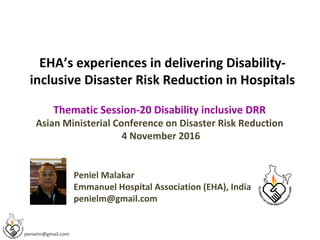AMCDRR 2016 EHAĪ»s experiences in delivering Disability-inclusive Disaster Risk Reduction in Hospitals Resized
- 1. penielm@gmail.com EHAĪ»s experiences in delivering Disability- inclusive Disaster Risk Reduction in Hospitals Thematic Session-20 Disability inclusive DRR Asian Ministerial Conference on Disaster Risk Reduction 4 November 2016 Peniel Malakar Emmanuel Hospital Association (EHA), India penielm@gmail.com
- 2. penielm@gmail.com Working together toward this transformation ©C Accessibility for All & Everywhere
- 3. penielm@gmail.com EHAĪ»s journey toward Disability inclusive Hospital Disaster Preparedness & Response (DiHDPR) modules ? 2009: Hospital DRR Pilot with DIPECHO in 2 hospitals (implementing HFA-I & MDGs) ? 2010: Di HDPR presented & piloted in 1 hospital http://ehadmmu.com/assets/uploads/downloads/1433564535_DiHDPP%20v4.pdf ? 2009 ©C till date: more than 14 hospitals undergone (4 in Nepal) ? More than 1200 h/c leaders received training across India and Nepal (government & voluntary) ? 300+ hospitals sensitized on inclusive DRR ? 15 hospitals queued up for DiHDPR for 2017 in India & a few South Asian countries (Nepal; Myanmar; Bangladesh)
- 4. penielm@gmail.com Common barriers to Inclusive approach ? Attitudinal ©C complacency/stereotype (a bn & growing?) ? Communication ©C health info/promo ? Mobility/physical ©C itĪ»s okĪŁ stretchers/wheel chairs run ? Programmatic ©C time/eqpt or faci design (welfare vs. business) ? Socio-economic/stigma ©C education ? Policy/legislation ©C buildings/transport/risk cover ? Prohibitive costs ©C additional costs for low-Y countries Governments can improve health outcomes for people with disabilities by Improving ACCESS to QUALITY, AFFORDABLE healthcare services.
- 5. penielm@gmail.com Factors Affecting the Health of People with Disabilities and without Disabilities
- 7. penielm@gmail.com EHAĪ»s initiative toward inclusive DRR in hospitals ? Piloted (Assam) in one of its 20 hospitals in India,2010 ? Comprehensive approach through DiHDPR modules - 1. Prelude activities ©C GB adopts/sensitzn at all levels 2. Assessments ©C barrier free (b/f) faci 3. Team Formation ©C people with disabilities included 4. iHospital Disaster Management Plan ©C ? Inclusion; Alarm/EWS; Training; Evacuation; Eqpt; ? Safety level scoring 1. Training & Capacity Building ©C include/use vari tools 2. Audit ©C proactively looking at b/f access 3. Unified Response Mechanism ensures all DPOs engaged
- 8. penielm@gmail.com Safety audit tool ensures Barrier-Free HDMP
- 9. penielm@gmail.com Some important realization by h/care fraternity ? Hospitals are a high capital-intensive spcl instns ? Disaster impacts on a hosp has a larger collateral impacts (socio-economic) ? Patients admitted with critical conditions require special assistance even though they do not have any disability (ortho, post surgical, weak & pregnant) ? H/care (Medical & Nursing) fraternity are found least preferred for non-medical life-saving skills & vice versa (disasters donot discriminate) ? No priority treatment observed dg a disaster event for h/care fraternity (evacuation) ? Hospitals are the temple of hope for a disaster victim ? Most of the essential areas are not barrier-free
- 10. penielm@gmail.com Physical verification of all access points essential...
- 11. penielm@gmail.com Assessment includes ensuring ease of access...
- 12. penielm@gmail.com Is the investment meaningful...
- 13. penielm@gmail.com Is it a complete job ?
- 14. penielm@gmail.com Do you have appropriate alarm system for evac ?
- 15. penielm@gmail.com Are your staff/volunteers sensitized enough ?
- 17. penielm@gmail.com Earthquake & Fire drill at an Eye Hospital
- 18. penielm@gmail.com Ensure they are part of the DM Planning processes ?
- 19. penielm@gmail.com Wider engagement by including in DPO network?
- 20. penielm@gmail.com Emergency Medical Camps with specific focus to reach out people with disabilities
- 21. penielm@gmail.com Advocacy for Mainstreaming Disability in Disaster Response at the national level 2015
- 22. penielm@gmail.com RecommendationsĪŁ ? Availability of dis-aggregate data at the village level ? Village level DMP must include mapping of people with disabilities for quick evacuation ? Continuation of medication is criticalĪŁ ? EHA developed a Specialized Relief Kit for First Responders: DoĪ»s & DontĪ»s/Basic set of questions http://ehadmmu.com/assets/uploads/downloads/20150622_1434965435.pdf ? Recommend all Response Task Forces ? Awareness & Sensitization at the school level ? Hospital Safety Guidelines must include Di approaches (worst case scenario!) ? Availability of Di experts essential for practical implementation






















